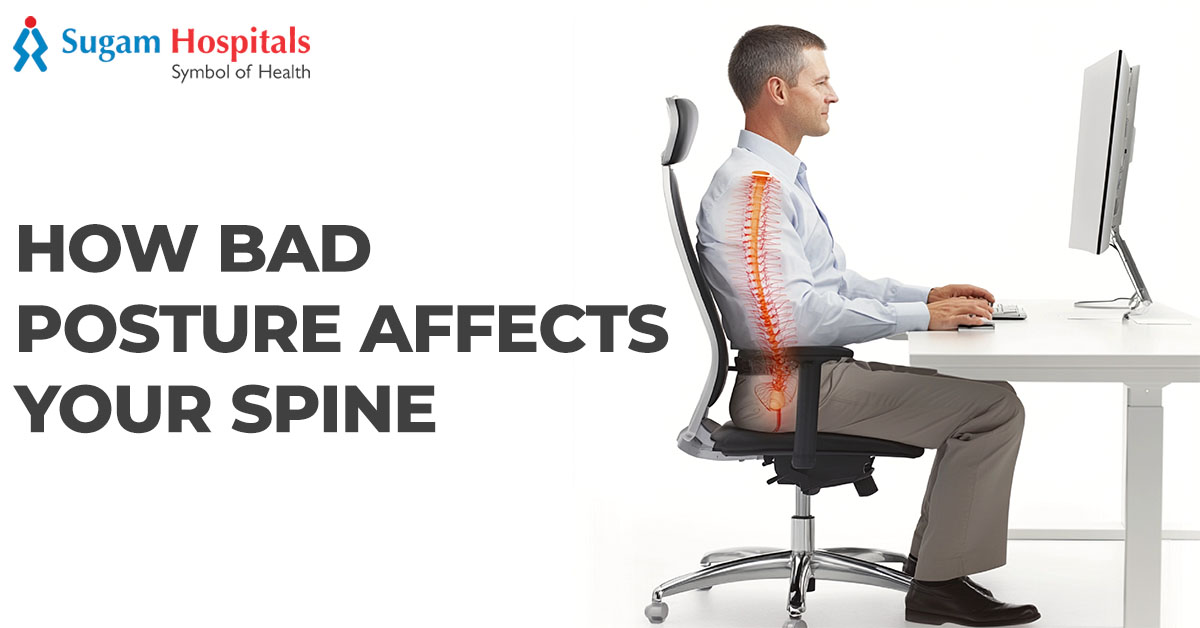How Bad Posture Affects Your Spine

How Bad Posture Affects Your Spine
July 11, 2025 by adminPosture is not just about sitting or standing properly, it’s also about how you hold your body throughout the day. Any activity that you perform in day to day life be it work at a desk, scrolling on your phone, or simply relaxing on your couch, your spine is always supporting your weight and trying to stabilize your position. Poor and repeated posture causes the spine to start to feel the stress of continuous poor posture making it weaker.
In this blog, we will take a closer look at Bad Posture Affects Your Spine and better posture to help your spine for a healthy supportive spine.
The Spine and It’s Natural Curvature
Your spine has three natural curvatures: one in your neck, one in your upper back, and one in your lower back. These natural curves are designed to help absorb impact from the ground, support the body’s weight, and allow for flexion and extension. Good posture respects the spine’s natural curvatures. Bad posture does not. When you slouch, hunch, or allow the weight of your head to tilt forward for long periods of time , those normal spinal curves become exaggerated or flattened which disrupts the natural balance of the spine.
Neck and Upper Back Strain
An forward head tilt – a position often observed in individuals bending over phones or looking down at screens is compressing the cervical spine. Even a slight anterior head tilt places excessive load on your neck muscles and prolonged periods in this position leads to stiffness, reduced mobility and chronic pain in the upper back. Initially you may notice your shoulders rounding forward but in time you will develop additional muscle fatigue and increased muscle tightness.
Mid and Lower Back Pain
When you slouch in chairs or lean forward when standing, this shifts the center of gravity of the body. When this takes place, it places strain on the lower portion of your spine (lumbar). Eventually, the lower back will have to overcompensate for this up-rightness, and you may experience a consistent ache in the low back, tight hips, and even pain radiating down the leg from nerve compression.
Disc Pressure and Spinal Wear
Bad posture increases the loads on your spinal discs – the cushioning material between each vertebra. Eventually, this uneven pressure starts to deteriorate the disc material faster than usual and, eventually, bulges or herniates the disc. Bulging and herniated discs can compress surrounding nerves causing symptoms such as numbness, tingling, or weakness in the arms or legs. While these conditions develop gradually, the long-term outcomes can be significant and, in most cases, avoidable.
Breathing and Circulation Can Also Be Affected.
Postural slumping puts a compression on the chest and diaphragm. Lung expansion becomes limited thus restricting oxygen intake, leading to fatigue and inability to concentrate and potential strain on the cardiovascular system over time. Blood flow can also be affected, particularly in people who maintain a slumped position in postures for prolonged hours without breaks.
Signs It’s Taking a Toll
Some early indications of back or neck issues associated with poor posture consist of constant stiffness in your back or neck, frequent headaches, feelings of tiredness after sitting, and the feeling of needing to stretch or readjust your position constantly. Addressing these indications is crucial as they can lead to further complications with the musculoskeletal system.
Shifting to Better Posture
The good news is that this is something you can work on! Here are a few small daily shifts that can go a long way:
- Adjust your chair and screen so your eyes are level with the screen.
- Keep your feet flat on the floor and avoid cross-legged positions.
- Use lumbar support if required and avoid slumping or perching on the front of your chair.
- Take a break every 30 or 45 minutes to stretch and reset your posture
If pain associated with your posture continues or starts to affect your everyday life, please take heed; do not disregard it. Chronic pain, limited movement or uncomfortable sensations from the nerve could mean that something else could be happening. Getting an expert opinion sooner than later will save you from more serious problems and help you to return to a comfortable routine.
For someone looking for reasonable orthopedic care, an experienced ortho hospital in Chrompet should be able to give you the proper treatment for recovery. With access to specialized care and facilities, recovery and spine health does not have to be an unattainable goal.

